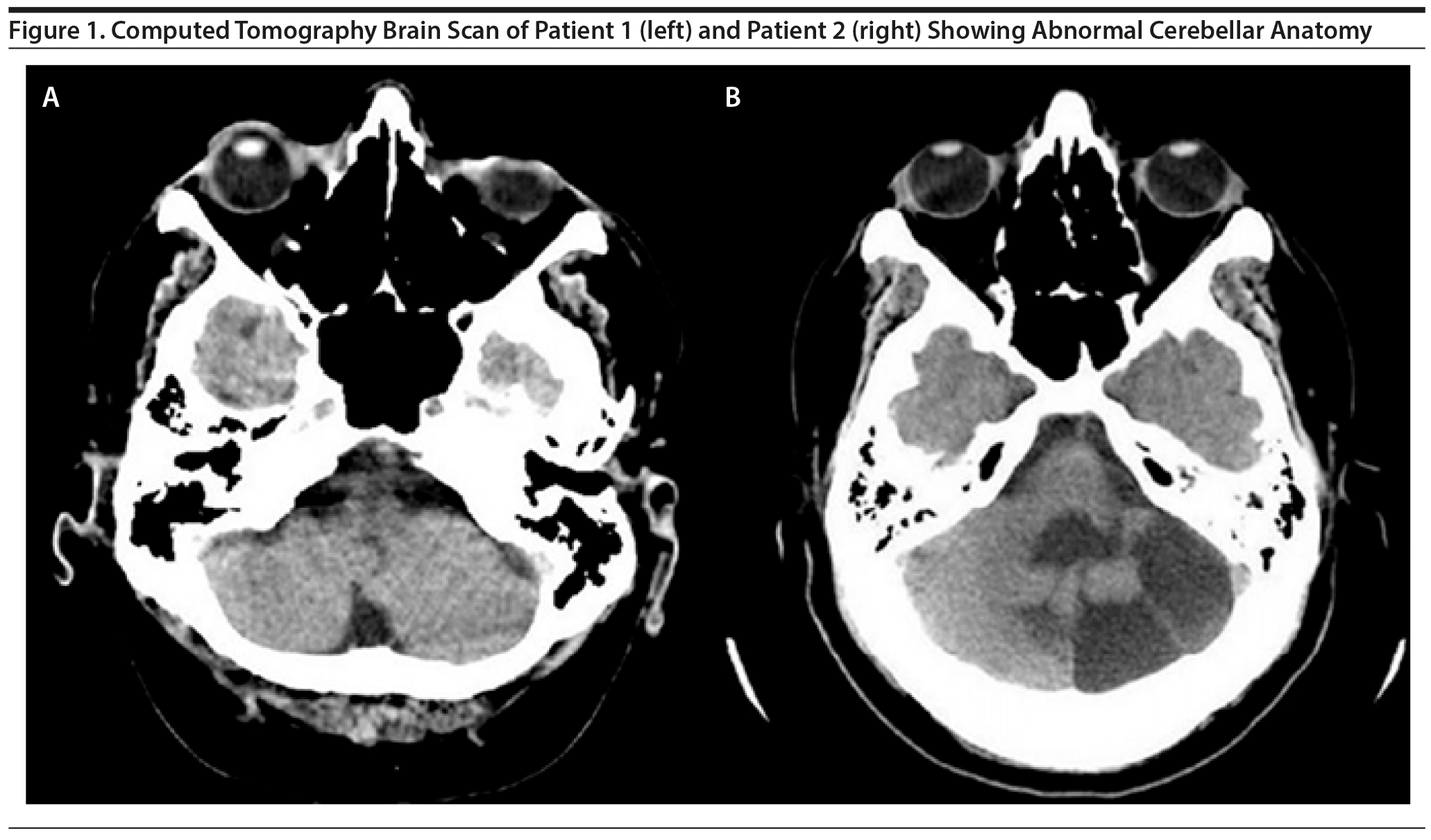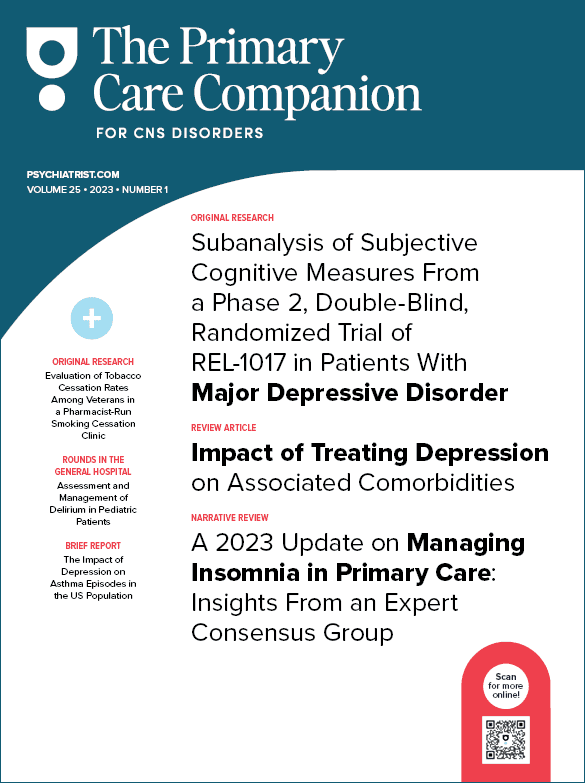
Psychosis in Autistic Patients With Splinter Skills (Savant Syndrome) Presenting Abnormal Cerebellar Anatomy Misdiagnosed as Disorganized (Hebephrenic) Schizophrenia
Adults with autism may present with splinter skills (savant syndrome)1 as well as some schizophrenia-like psychotic disorders.2 Both clinical profiles may be confused with disorganized (or hebephrenic) schizophrenia. Here, we present 2 clinical vignettes of autistic savant patients for whom a complete neuropsychiatric assessment provided the correct diagnosis.
Patient 1: Autism With Splinter Skills (Savant Syndrome)—Calendar-Calculating Ability
A 44-year-old obese man was assessed at a routine appointment after the diagnosis of disorganized (hebephrenic) schizophrenia. He had been admitted to a psychiatric hospital 24 years ago following a psychotic episode with suicidal ideation and auditory hallucinations. He had 1 sister with schizoaffective disorder, 1 sister with schizophrenia, and a niece with bipolar disorder. During the assessment, we detected no affective, positive, or negative symptoms, but moderate cognitive impairment and viscosity were present, and the patient spontaneously showed stereotyped behavior with an incredible calendar-calculating ability (eg, he was able to say the day of the week for any date in a handful of decade-long time spans). We proceeded with routine examinations for diagnosis clarification. No changes were found on routine blood and urine tests. His electroencephalogram (EEG) revealed generalized slowing, suggesting nonspecific diffuse brain dysfunction, and cerebellum atrophy was evident on a computed tomography (CT) brain scan (Figure 1A). After the patient’s diagnosis was changed to atypical autism complicated by organic delusional (schizophrenia-like) disorder (ICD-10 criteria), his medication was optimized.
Patient 2: Autism With Splinter Skills (Savant Syndrome)—Encyclopedic Knowledge of Geography
A 36-year-old obese man was assessed at a routine appointment after the diagnosis of disorganized (hebephrenic) schizophrenia. He had been admitted to a psychiatric hospital 20 years ago following a psychotic episode with aggressiveness, self-reference delusions, and auditory hallucinations. His mother had recurrent depression. At assessment, we detected no affective, positive, or negative symptoms, but moderate cognitive impairment and circumstantiality were present, and the patient spontaneously showed highly specific interests with an encyclopedic knowledge of geography (eg, he was able to recite dozens of capitals of countries from around the world). We proceeded with routine examinations for diagnosis clarification: no changes were found on blood or urine tests, his EEG was normal, and a CT brain scan revealed cerebellum hypoplasia (Figure 1B). After the patient’s diagnosis was changed to atypical autism complicated by organic delusional (schizophrenia-like) disorder (ICD-10 criteria), his medication was optimized.
Discussion
Autism may be present in 50% of patients with splinter skills (savant syndrome), while up to 10% of patients with autism may have splinter skills (savant abilities).3 There has been significant advancement in various aspects of scientific knowledge concerning the role of the cerebellum in the etiopathogenesis of autism, including abnormal cerebellar anatomy.4 So, when one sees a patient with splinter skills (savant syndrome), first, there is a high probability of autism, and, second, the neuroimaging scan may be a useful tool in the differential diagnosis. On the other hand, current literature5 offers broad explanations of cerebellar abnormalities that may be present in both schizophrenia and autism spectrum disorders such as a decrease in cerebellar volume, which may partially explain some difficulties regarding differential diagnosis. Here, we present 2 clinical vignettes of psychosis in autistic patients with splinter skills (savant syndrome) misdiagnosed as disorganized (hebephrenic) schizophrenia for 2 decades. Both patients had neuroimaging changes of the cerebellum that went unnoticed for a lengthy time span, reminding clinicians that a complete and careful neuropsychiatric assessment should always be performed before diagnosing a patient with schizophrenia.
Published online: September 12, 2019.
Potential conflicts of interest: None.
Funding/support: None.
Patient consent: Both patients provided oral consent for publication of the case reports. Information has been de-identified to protect anonymity.
REFERENCES
1.De Marco M, Iavarone A, Santoro G, et al. Brief report: two day-date processing methods in an autistic savant calendar calculator. J Autism Dev Disord. 2016;46(3):1096-1102. PubMed CrossRef
2.Lugo Marín J, Alviani Rodríguez-Franco M, Mahtani Chugani V, et al. Prevalence of schizophrenia spectrum disorders in average-IQ adults with autism spectrum disorders: a meta-analysis. J Autism Dev Disord. 2018;48(1):239-250. PubMed CrossRef
3.Treffert DA. Savant syndrome: realities, myths and misconceptions. J Autism Dev Disord. 2014;44(3):564-571. PubMed CrossRef
4.Fatemi SH, Aldinger KA, Ashwood P, et al. Consensus paper: pathological role of the cerebellum in autism. Cerebellum. 2012;11(3):777-807. PubMed CrossRef
5.Phillips JR, Hewedi DH, Eissa AM, et al. The cerebellum and psychiatric disorders. Front Public Health. 2015;3:66. PubMed CrossRef
aSchizophrenia Department, Hospital Júlio de Matos, Centro Hospitalar Psiquiátrico de Lisboa, Lisbon, Portugal
bClínica Universitária de Psiquiatria e Psicologia Médica, Faculdade de Medicina, Universidade de Lisboa, Lisbon, Portugal
cChild and Adolescence Psychiatry Department, Hospital Dona Estefânia, Centro Hospitalar Lisboa Central, Lisbon, Portugal
*Corresponding author: Sara Pires, MD, Consulta Externa de Pedopsiquiatria—Hospital Dona Estefânia, Rua Jacinta Marto, 1169-045 Lisbon, Portugal ([email protected]).
Prim Care Companion CNS Disord 2019;21(5):18l02421
To cite: Gama Marques J, Pires S. Psychosis in autistic patients with splinter skills (savant syndrome) presenting abnormal cerebellar anatomy misdiagnosed as disorganized (hebephrenic) schizophrenia. Prim Care Companion CNS Disord. 2019;21(5):18l02421.
To share: https://doi.org/10.4088/PCC.18l02421
© Copyright 2019 Physicians Postgraduate Press, Inc.
Enjoy free PDF downloads as part of your membership!
Save
Cite
Advertisement
GAM ID: sidebar-top





